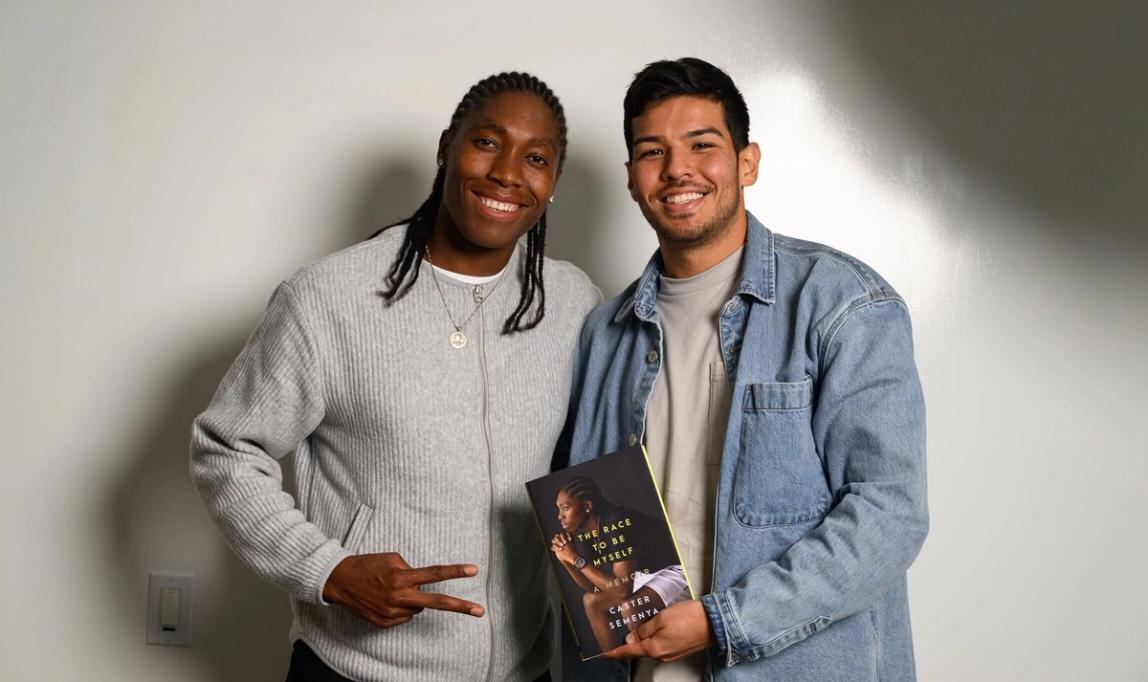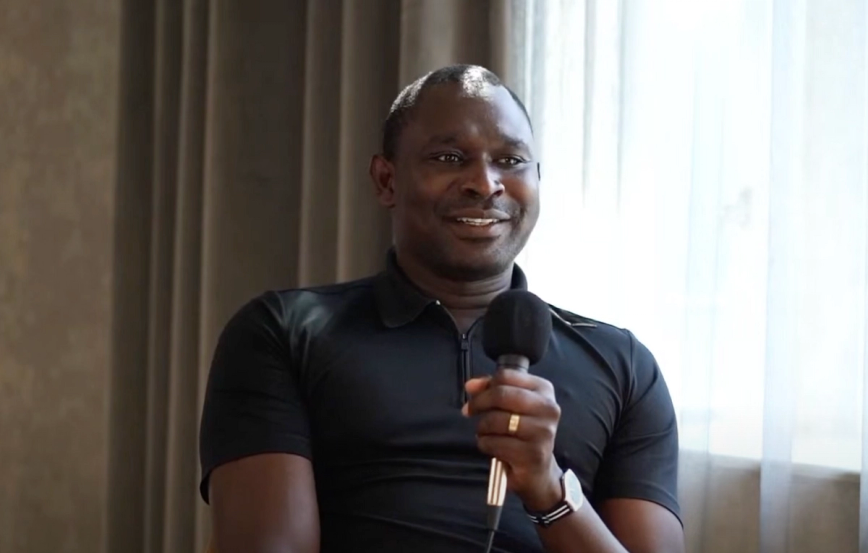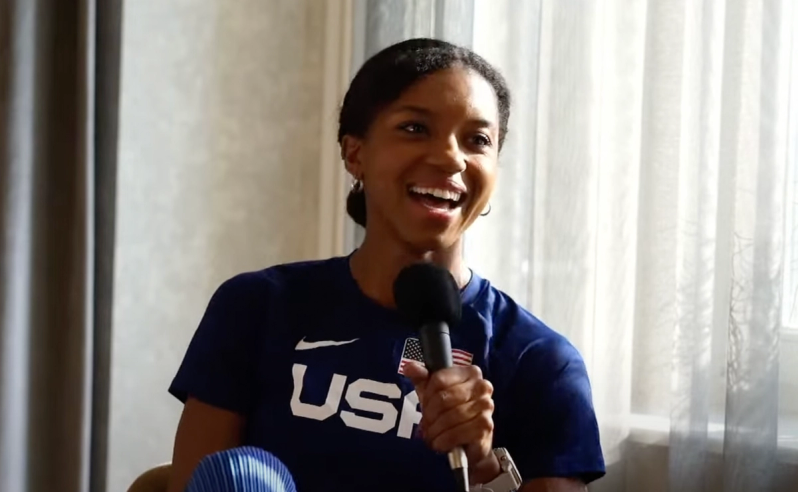November 1, 2023
Listen
"I know my purpose. I know why I'm here. So when people start talking, I love it because they build me. They make sure that I stay focused."
Caster Semenya is a two-time Olympic champion and three-time world champion in the 800 meters. She just released her book, The Race To Be Myself, where she opened up for the first time about the personal and professional effects of taking hormone-suppressing medication for six years following her win at the 2009 World Championships at 18 years old.
Semenya is considered a female athlete with differences in sexual development (DSD) due to her hyperandrogenism, which leads to higher-than-usual levels of natural testosterone in her body. For the past few years, World Athletics has required DSD athletes to medically reduce their testosterone levels in order to compete in events from 400 meters to the mile. As a result, Semenya has not raced her signature event since 2019.
Instead, a lot of her time in the past few years has been focused in the courtroom as she’s taken on several legal battles against World Athletics to have the regulations overturned. Europe’s top human rights court ruled in Semenya’s favor that her appeal to a Swiss Federal Tribunal following the dismissal of her case to the Court of Arbitration for Sport was not properly heard. She’s awaiting a verdict from the European Court of Human Rights. World Athletics issued a statement to Reuters this week saying that the governing body has only ever been interested in protecting the female category.
The book includes a gripping account of how she went to a hospital in South Africa expecting to undergo an anti-doping test only to realize later she was undergoing a gender verification test. Another test followed in Berlin before the World Championship final and then a media storm blew up when she learned about her condition along with the rest of the world when the results of the test were leaked.
The book also includes some interesting and insightful recaps of her races at the London Olympics and the world championships that followed.
I fully understand this is a hotly debated topic within the sport. This isn’t going to be a debate but rather hearing more of Caster’s story now that she’s finally opened up about it and why her focus now shifts to fighting for others.
Host: Chris Chavez | @chris_j_chavez on Instagram
Guest: Caster Semenya | @castersemenya800m on Instagram
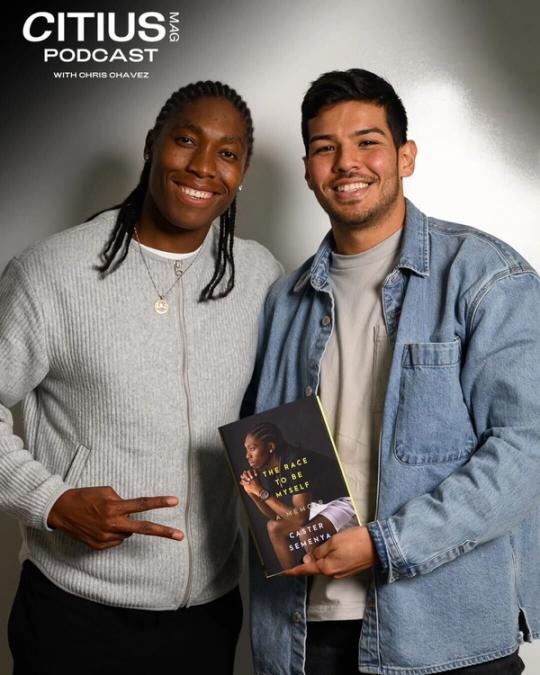
NOTABLE QUOTES
Why is now the time for you to come forward and share everything?
“I think it’s perfect timing because I'm ready, I’m mature enough. I have knowledge and skills to tell the story. But the most important thing is about educating people. It's about giving those lessons, but also sharing my experience with those who are close to me. It was a process for me to heal. I'm ready emotionally, physically, psychologically. I think it was just about time.”
Has it been hard to keep quiet and keep those feelings suppressed? I've been in those post-race interviews when there have been other reporters who ask those questions. It's hard to not get angry. It's hard to not get emotional. But you never really lashed out.
“For me it's easy, because I know my purpose. I know why I'm here. I know what I'm doing. I know my destination. So when people start talking, I love it because they build me. They make sure that I stay focused… They teach you how to react to all these things. And then you start realizing, ‘you know what? I don't need to react to that. I just need to act’. So for me, just portraying that on the track and making sure that I do my work with perfection, that's what defines me.”
It's during the formative years of your childhood that you start getting questions and other children are asking you about your gender. A lot of people think this started in 2009.
“It started from the beginning... God gave me this life knowing that I am the change. And that's why we now have this book. We're going to teach people how to carry themselves and how to have better relationships with themselves. The most important thing about this book is not about these things that have happened – it's about how I've endured, how I carried myself, how I kept my cool, all those things.”
In the warm up area, you describe that you saw fear in the eyes of your competitors. In the book, you put that into words in just one sentence. Can you describe to me what that looked like?
“I was the one that was running the show. I was all over their heads… I see all these ladies and they're looking at me. I'm like, ‘yeah, I'm the dog. I have arrived!’ It made me feel good because I was confident… I was there to rule. I belonged and I was there to stay, regardless of what happened.”
June 2019 was your last 800m race. After that, in practice, did you ever do an all-out 800m?
“No, I have never done that… I make 800 meters. 800 meters does not make me. You must go back to the statistics. You will understand. If you look at my stats, you’ll understand what I mean. So for me, I have no unfinished business in the 800 meters because I have done what I was supposed to do.”
If the Caster sitting in front of me knew today how her career was going to pan out, and we go back to the little girl in Limpopo, what would you have said to her about the road ahead? It hasn’t been an easy road.
“Take time to understand yourself, take time to study the person you are. Love yourself, appreciate yourself, accept yourself, have the best relationship with yourself… Don’t worry about what people say about you. Worry about what makes you happy.”
We're heading into an Olympic year. In terms of your own professional career on the track, is that a goal for you? Is there any fulfillment in the Olympics next year?
“I no longer have desires for anything in terms of competition. For me now, I do sports socially. But I will never retire because I've been stopped from running… Retirement will not be the word I will use; I'll just continue advocating for sports, advocating for women, fighting for what is right and make sure that women are treated with respect. I’ll always stand for women."
The testing beforehand in South Africa and the testing in Berlin – can you describe to me the process of putting that to paper and writing that? What were you feeling in that moment?
“I think it was a healing process because you're reliving the memories and I wanted to see if I was feeling pain or anything. Funny enough, I did not. Because for me, if you are a messenger, you are here to send a strong message to the world…
For me, it's just those memories. They mean a lot to me because it's my life. You must never let anyone violate you to that extent. You must not let desperation determine your destiny. You should know what your rights are. I didn't know my rights. But now I'm teaching people to understand that you have a right to say no. I think it's very important for each and every individual to understand that. For me, reliving those moments, it was a healing process.”
We see that since 2019, when the rules got put back in place, you're still the biggest one who's taken to the fight.
“Some of us are vocal enough to fight for what is right. We sacrifice ourselves for them so that they can have a chance to compete. We want to make it right. We want to make it so people can understand that this is nonsense. Regulating women's sports is not really important because you’re actually killing women's sports.
If we're going to talk about fairness in sports, this debate will never end because no one can win the debate. At the end of the day, if you talk about fairness in sports, we must start with men. Go fix men's categories. Categorize men. Say, ‘short guys, go to that side. Tall guys, go to that side… If you're going to categorize based on genetics, it cannot work.”
At the Rio Olympics, you sat down to answer questions when there's so much tension and controversy in the air. The first question gets asked and you immediately diffuse the whole situation – because if you didn't do that, it was going to be nonstop questions to you, Margaret and Francine about DSD.
“I had to send a statement to say that we own the moment. We are the moment. Let us enjoy the victory.’ You are not going to come here to talk about someone who was not in the race, someone who is regulating women's sports. We want to talk about the race. Ask us questions based on the race, don't ask questions based on the future that we don’t know. I don't know what's going to happen tomorrow, but I know what's happening in this moment. I know I'm happy that I won gold for my people. So ask me about that.”
Support The Sponsor

OLIPOP
OLIPOP is a prebiotic soda with only 2-5g of sugar that is actually good for your gut health. – and it's delicious. Use code CITIUS25 for 25% off non-subscription orders. Learn more here.

BANDIT RUNNING
BANDIT RUNNING is a performance and lifestyle running apparel brand founded by members of the NYC Running Community in 2020. What started with socks and accessories has grown into a full-fledged apparel line.
VDOT
VDOT is offering 20% off their coaching subscription using the code citiusmag. Download V.O2 in the app stores or visit vdoto2.com to start your 30-day free trial. Athletes without a coach can use the same code and try out their fully automated VDOT Adaptive Trainer and sync to an Apple Watch, COROS or Garmin. Leverage the world-famous VDOT formulas and take your running to the next level with V.O2.
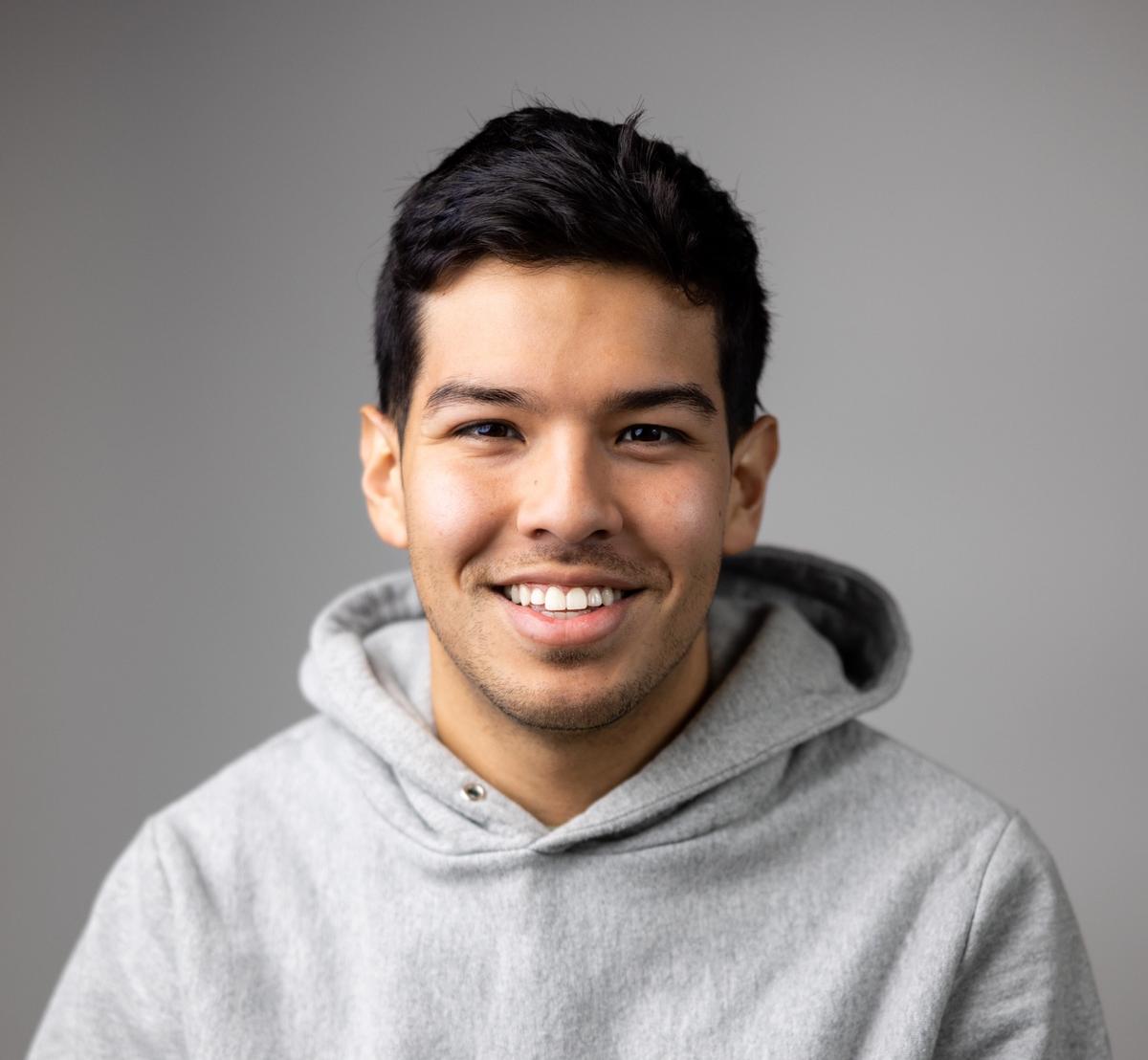
Chris Chavez
Chris Chavez launched CITIUS MAG in 2016 as a passion project while working full-time for Sports Illustrated. He covered the 2016 Olympics in Rio de Janeiro and grew his humble blog into a multi-pronged media company. He completed all six World Marathon Majors and on Feb. 15th, 2025 finally broke five minutes for the mile.
